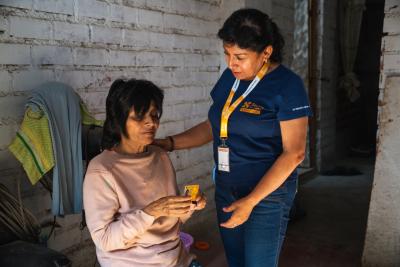In Peru, the right to health begins in an unexpected place: a letterhead, a registration number. Access to a vaccine, to medicines, to a hospital bed can depend on something as bureaucratic as an identity card. And for millions of people, that door remains closed.
The National Council for the Integration of Persons with Disabilities (CONADIS) is the institution that officially recognizes those living with a disability and allows them access to social and health benefits. However, it is estimated that only one out of every six people with disabilities in the country is registered in its registry. The rest - close to 3 million citizens - remain in a sort of administrative limbo: they exist, but do not count.
“Within our Social Protection Program (PPS) we have as a structured component access to documentation,” explains Genaro Anco, head of PPS at Socios En Salud. “It’s not just about the payment of the cost of the DNI, the lack of the identity document or the delivery of it through social campaigns, but all the social factors behind it.”
Document to include: children, older adults and migrants
In theory, every child born in a Peruvian hospital should be immediately registered in the National Registry of Identification and Civil Status (RENIEC). In practice, however, the rule is often broken. Absent parents, family conflicts, disinterest or simple carelessness condemn many newborns to grow up without documents.
“If there is no birth certificate, we start the process from scratch at the municipality or the Civil Registry, with witnesses or documents such as vaccination cards,” explains Anco. Community health agents accompany families through a process that can take up to 15 days.
The situation is even more complicated for the elderly. Men and women aged 65 or 70 who were never registered at birth. To access social programs such as Pension 65 - which provides a subsidy to seniors in extreme poverty - the document is essential, forcing them to track down communities of origin and rely on witnesses to attest to their identity.

Agentes comunitarias de salud de Socios En Salud acompañan a las personas en el acceso a sus derechos básicos, como la obtención del DNI.
Foto de SES
“In some cases we have had to be witnesses ourselves, because often the relatives don’t want to get involved,” Anco recalls. If the record books have been lost - as is often the case in rural areas - reconstructing an identity can take anywhere from six months to more than a year.
The same difficulty is faced by migrants. According to the National Superintendence of Migration, more than half a million foreigners live in an irregular situation in the country. Being undocumented limits their access to health care.
“With migrants, mainly people affected by HIV or tuberculosis, we support their enrollment in the Seguro Integral de Salud (SIS). In some cases they are accepted immediately because of their vulnerable condition, but in others they are required to have a foreigner’s card, a procedure that takes a long time,” says Anco.
That time lost in the bureaucracy is not neutral: it means months without medicines, without subsidies, without the basic right to be recognized as citizens, and in many cases the undocumented person dies while waiting or processing documents.
Access to social programs
Documentation is the key to access social programs that allow vulnerable families to have a more dignified life.
In the case of people living with schizophrenia, the PPS provides comprehensive accompaniment throughout the process: from medical diagnosis and obtaining the disability certificate, to managing the CONADIS card, updating in the Household Targeting System (SISFOH) and enrollment in the Contigo program. “Before, we had to follow the management process through the municipality, which could take up to a year. Now we go directly to the CONADIS headquarters and the card is delivered in two or three days, maximum one week.”
The difference is not minor: between waiting 365 days or 7, what changes is not only a calendar, but the daily life of someone who needs medication, food and care.
The next step is the approval of the economic subsidy of the Contigo program, which depends on the updated categorization in the SISFOH as poor or extremely poor. Although this procedure is a municipal task, from the PPS we also follow up online through the official Contigo platform, verifying with the DNI the approval status until the person receives the subsidy of 300 soles bimonthly. However, this process can take between eight months and two years, an excessive time that, in many cases, becomes unfair: some people die before accessing this expected support from the State.
Since 2019, Socios En Salud has accompanied more than 499 people living with schizophrenia in this process, of which 50 people already receive this economic subsidy. A figure that does not translate the wear and tear of those involved: families traveling hours to sign a paper, community agents touring neighborhoods to deliver notices.
“Every DNI or CONADIS card we get opens a door. Our job is to make sure that no one is left out because they don’t have a paper, since it is a social right that the person diagnosed with severe disability has,” summarizes Anco.
With that goal in mind, between July 2024 and June 2025, PPS carried out 141 successful procedures: from paperwork to access to social programs. The right to health begins with identity, and guaranteeing that first step changes entire lives.
